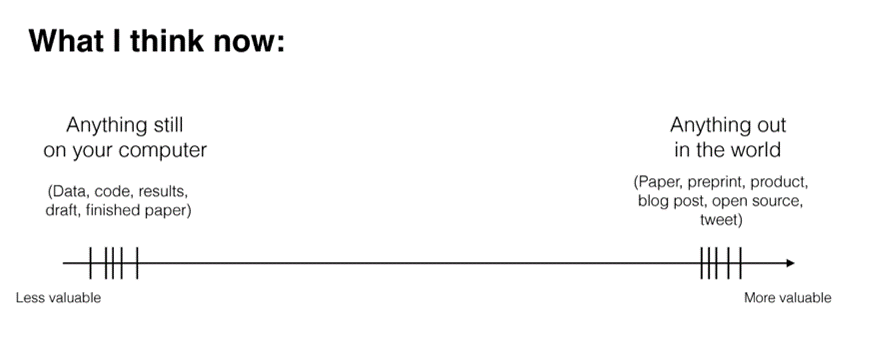A couple of weeks ago, I gave my first talk in a data science/rstats conference; Fitting Humans Stories in List Columns: Cases from an Online Recruitment Platform. It was at EARL Boston and it was a good experience as I received positive feedback from the attendees. I intended to write about the story I shared in my talk. But then I recalled Emily Robinson’s post Giving Your First Data Science Talk, published last July. And I though about writing about my own experience and how the rstats community provided support.
Why to give a talk in the first place?
People have different reasons to give talks. For me the main motives are:
1- I currently work in a city with a relatively small rstats and data science community. There are very few meetups, and consequently, rare opportunities to meet a diverse community, share knowledge and get exposed to new stuff. So going to conferences, even if I have to fly a long distance, has a significant added value.
2- I like to share and contribute to the rstats community, and that’s why I started my blog mid 2016. Because it is a mutual benefit, where my content might help the beginners and others' feedback definitely helps me see where I am and what I could improve. So a meetup/conference talk is a different form of sharing, while getting instant feedback.
3- I could see a story to tell about my work and how certain framework/tools like the tidyverse empowers me to do effective data analysis, with a level of flexibility that helps me look beyond summary statistics and shallow correlations. So I wanted to communicate this and see how it will be perceived.
But How was the experience of submitting abstracts?
First of all I’d like to point out that I got THREE rejected submissions in 2017 before getting THREE accepted abstracts in the same year. And I have to say that these rejections were valuable, because they helped me debug my work, reach out to more people from the community for feedback and definitely improve my submissions.
The THREE rejected submissions:
-
A lightning talk at Rstudio::conf 2017, and I admit it was not that good compared to the accepted.
-
A talk at UseR! 2017, and after attending the newbie session, where Heather Turner talked about their selection criteria, I could see the areas of improvement in my abstract.
-
A talk at EARL London 2017. After asking for feedback, I could see how I was supposed to rewrite the abstract.
The THREE accepted submissions:
-
A talk at EARL Boston 2017 which I already gave.
-
A talk at Budapest BI Forum, but unfortunately I couldn’t make it due to my work schedule :(.
-
A poster at Rstudio::conf 2018, but unfortunately won’t be able to make it for logistical reasons :(.
So how did the rstats community help?
While writing my first three submissions, I haven’t asked others to review them. Maybe I thought they were ok, or I didn’t know whom should I ask!. But when I went to UseR! conference, I met many people from the community, especially from Rladies who offered to read my abstract and advise me.
When I went back, I rewrote the abstract and shared with several people for review. And I have to say that they helped me look to what I’ve written from a different perspective, and reformulate it. On top of the reviewers were Charlotte Wickham and Maëlle Salmon. But I also got other reviewers like Emily Riederer who reached out to me to exchange reviews about our abstracts, since she was also submitting one (Don’t miss her talk at Rstudio::conf!). Also Steph Locke connected to me through Rladies initiative for abstract review, and Agnes Salanki gave me some comments.
All that showed how a supportive community can make a difference and help more people get engaged.
But what about Preparing and giving a talk?
So as my abstract got accepted, I first had to make the hard choice of picking one of the conferences (EARL and Budapest BI Forum), because both were in November. So I had to review my work schedule and I picked EARL. Then I started to finalize the slides and rehearse. But during this phase, I had sometimes where I questioned whether the talk would resonate with the audience, and whether they’d find a value in it. But I reminded myself of what Emily Robinson said in her post:
“You probably have more to offer than you think”
or what David Robinson says about the value of anything shared Vs. anything still on my computer.

So I moved on, and since i had to submit it a week before the conference, I had time to rehearse and share with a couple of colleagues who also gave some comments regarding the story, slides and flow. But I haven’t promoted my talk since I don’t feel comfortable doing so, I just wrote that I’ll be speaking at EARL. But Maëlle Salmon, Emily Riederer, and Rladies advertised my talk, although they haven’t seen any previous talks by me. And then came the day of the talk where things went well. People connected to what I was saying and I got positive feedback.
So this was my journey to the first talk, and I hope more people contribute to the community and write similar posts (as I was inspired by Emily Robinson’s). Because usually the beginners see the final result; a speaker on the stage without the history of trials, the abstract drafts that were thrown away, the anxiety that kicks in, and all what’s behind the scenes!